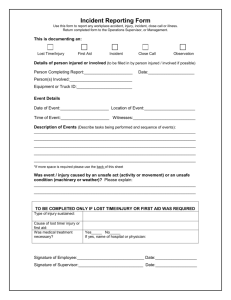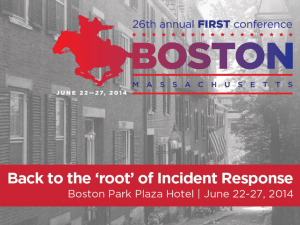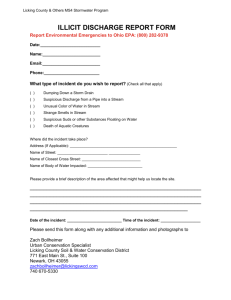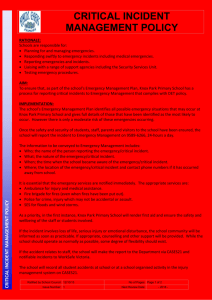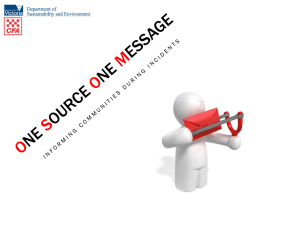Serious Incident Reporting Policy and Procedure
advertisement
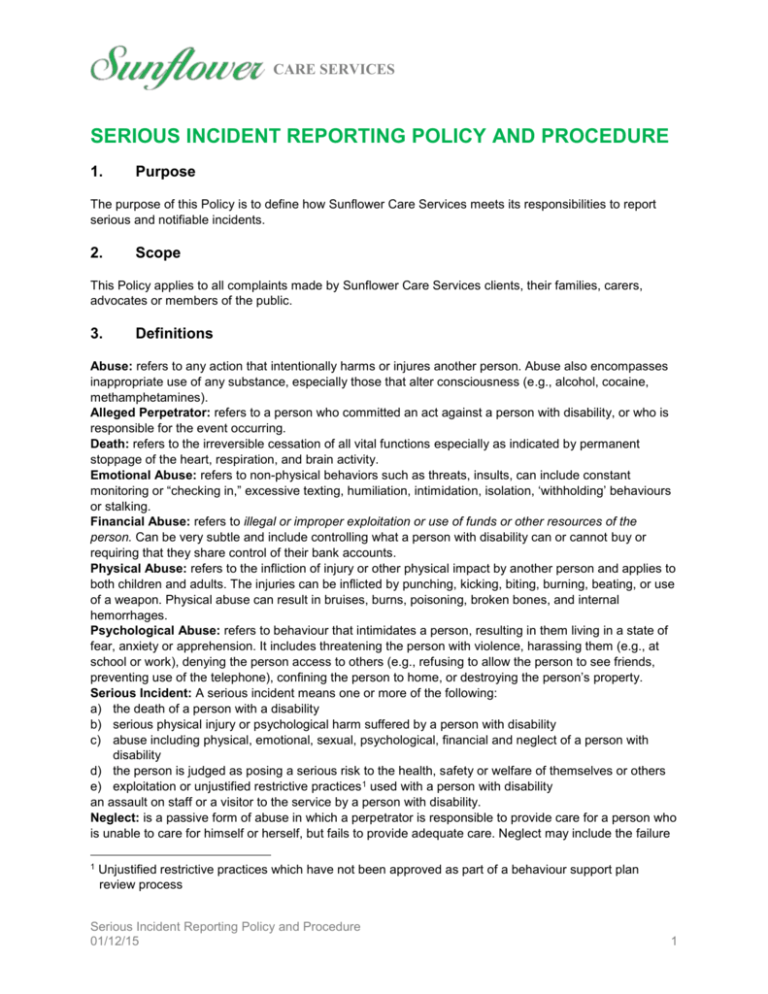
CARE SERVICES SERIOUS INCIDENT REPORTING POLICY AND PROCEDURE 1. Purpose The purpose of this Policy is to define how Sunflower Care Services meets its responsibilities to report serious and notifiable incidents. 2. Scope This Policy applies to all complaints made by Sunflower Care Services clients, their families, carers, advocates or members of the public. 3. Definitions Abuse: refers to any action that intentionally harms or injures another person. Abuse also encompasses inappropriate use of any substance, especially those that alter consciousness (e.g., alcohol, cocaine, methamphetamines). Alleged Perpetrator: refers to a person who committed an act against a person with disability, or who is responsible for the event occurring. Death: refers to the irreversible cessation of all vital functions especially as indicated by permanent stoppage of the heart, respiration, and brain activity. Emotional Abuse: refers to non-physical behaviors such as threats, insults, can include constant monitoring or “checking in,” excessive texting, humiliation, intimidation, isolation, ‘withholding’ behaviours or stalking. Financial Abuse: refers to illegal or improper exploitation or use of funds or other resources of the person. Can be very subtle and include controlling what a person with disability can or cannot buy or requiring that they share control of their bank accounts. Physical Abuse: refers to the infliction of injury or other physical impact by another person and applies to both children and adults. The injuries can be inflicted by punching, kicking, biting, burning, beating, or use of a weapon. Physical abuse can result in bruises, burns, poisoning, broken bones, and internal hemorrhages. Psychological Abuse: refers to behaviour that intimidates a person, resulting in them living in a state of fear, anxiety or apprehension. It includes threatening the person with violence, harassing them (e.g., at school or work), denying the person access to others (e.g., refusing to allow the person to see friends, preventing use of the telephone), confining the person to home, or destroying the person’s property. Serious Incident: A serious incident means one or more of the following: a) the death of a person with a disability b) serious physical injury or psychological harm suffered by a person with disability c) abuse including physical, emotional, sexual, psychological, financial and neglect of a person with disability d) the person is judged as posing a serious risk to the health, safety or welfare of themselves or others e) exploitation or unjustified restrictive practices 1 used with a person with disability an assault on staff or a visitor to the service by a person with disability. Neglect: is a passive form of abuse in which a perpetrator is responsible to provide care for a person who is unable to care for himself or herself, but fails to provide adequate care. Neglect may include the failure 1 Unjustified restrictive practices which have not been approved as part of a behaviour support plan review process Serious Incident Reporting Policy and Procedure 01/12/15 1 CARE SERVICES to provide sufficient supervision, nourishment, or medical care, or the failure to fulfill other needs for which the person cannot provide themselves. Sexual Abuse: refers to any act of a sexual nature performed that a person has not consented to, or that are performed in a criminal manner, as with a child or with a non-consenting adult. This includes rape, incest, oral copulation, and penetration of genital or anal opening with a foreign object. The term also includes any sexual act that could be expected to trouble or offend another person when done by someone motivated by sexual interest, including indecent exposure and acts related to sexual exploitation, such as those related to pornography, prostitution involving minors, or coercion of minors to perform obscene acts. Serious Illness: refers to conditions that require immediate care to relieve suffering and minimise morbidity and mortality risk. Serious illnesses can include conditions involving the cardiovascular, respiratory, gastrointestinal, musculoskeletal, neurological, the immune system and dermatological and metabolic systems. Notifiable Incident: means any of the following: (a) the occurrence of a Serious Incident (b) where a Service User causes or contributes to injury, illness or death of any person, or poses a serious risk to the health, safety or welfare of any person (c) any referral of any matter or complaint regarding any Service User, the Services or the Service Provider generally, to any regulatory or investigative body (d) the charging of the Service Provider or an Associate with a criminal offence involving a sexual offence, dishonesty or breach of trust or which otherwise may result in imprisonment of that person (e) serious verbal or written complaints received in relation to the Service or in relation to the Service Provider generally (f) the occurrence of any event which may cause adverse publicity including but not limited to if the Service Provider is contacted by the media for comment on any aspect of the Services or involving a Service User. Unjustified restrictive practice: refers to practices that have not met the requirements of the Code of Practice. Please note an unjustified restrictive practice only needs to be reported if it falls within the definition of a ‘serious’ or ‘notifiable’ incident. 4. Policy Statement Sunflower Care Services is committed to the wellbeing of individuals accessing its services. As part of this Sunflower Care Services recognises its responsibility to manage, report and investigate serious incidents. When a serious incident has occurred as defined in this guideline, Sunflower Care Services will ensure the matter is reported to the Commission using the Commission’s Serious Incident Report form. Sunflower Care Services will investigate incidents in a timely manner and is committed to developing appropriate strategies to eliminate or reduce the likelihood of future occurrences. Sunflower Care Services further recognises that this process can assist it to identify areas where further training for employees, review and modification of work practices, or equipment can be implemented and is committed to using information gained in the reporting process to improve its services in this regard. Sunflower Care Services will adhere to its reporting requirements as follows: The Disability Services Act 1993 section 25 (4) requires disability sector organisations (funded services) and services provided by the Disability Services Commission to report any death, significant serious physical injury or psychological harm, an assault (including sexual abuse); or neglect of a person with disability in their care. The intent of the legislation is to safeguard people Serious Incident Reporting Policy and Procedure 01/12/15 2 CARE SERVICES with disability, make disability service providers and Commission staff more accountable and ensure sound practices are in place to reduce the occurrence of such incidents. Under the Delivering Community Services in Partnership General Provisions for the Purchase of Community Services by Public Authorities Agreement, disability sector organisations are also required to report notifiable incidents in addition to serious incidents. When a ‘notifiable incident’ occurs that does not fall within the definition of serious incident, reports are still to be made using the Serious Incident Report Form in the ‘other notifiable incident’ section. 5. Serious Incident Report Procedure The following procedure should be followed when reporting serious incidents. 5.1 Reporting responsibility The responsibility for reporting all serious incidents rests with Sunflower Care Services. This applies to incidents that occur when the individual is outside the receipt of a service as well as those that occur when in service. A Serious Incident Report (SIR) form should be completed for each individual with disability even if several individuals are involved in one serious incident. If one individual is involved in several incidents each incident must be reported separately. Immediate actions taken to manage the situation should be recorded on the form. Information on completing the Serious Incident Report Form is included within the document, Guidelines for completing the Serious Incident Reporting Form. 5.2 Completing the SIR form Sunflower Care Services is required to complete sections 1 to 3 of the serious incident report form only. The Chief Executive Officer will review and approve the form prior to forwarding to the Commission. a. The SIR form is to be completed electronically and forwarded to the Consumer Liaison Officer via email at clo@dsc.wa.gov.au. All SIR forms should be emailed as a word document only. b. The Office of the Director General within the Commission will complete sections 4 and 5 of the SIR form. 5.3 Reporting to the DSC Where the Director General becomes aware of issues involving suspected abuse or neglect which are an offence under the Act, the Director General will request a report or investigation on how the matter is being addressed and what the circumstances were leading to the incident. 5.4 External investigation Where the matter involves the potential for criminal charges, such as sexual abuse or serious physical abuse of a person with disability by a staff member or contractor of Sunflower Care Services, it is essential that the incident be reported to the police. This action should then be noted in Part 3 of the SIR form. Serious Incident Reporting Policy and Procedure 01/12/15 3 CARE SERVICES Where statutory agencies such as Police, Department for Child Protection and Family Support, Office of the Public Advocate and the Coroner are involved, this needs to be recorded in Part 3 of the SIR form. 5.5 Timelines All serious incidents must be reported to the Commission within seven (7) days. Commission staff must also forward the People at Risk (PAR) response plan in accordance with the PAR operational guidelines. 5.6 Confidentiality of information Reports of serious incidents are to be kept confidential, in accordance with the Disability Services Act and/or other applicable and relevant legislation, unless disclosure is required in the public interest. 6. Performance Standards This policy will be made available to all employees and all employees will receive training on what to do in the event of a serious incident and how to complete the Serious Incident Reporting Form. This policy will be reviewed on a two-yearly basis, with consultation of representatives of parties involved. 7. Related Documents 8. Serious Incident Reporting Form Serious Incident Reporting Guidelines Complaints Procedure Missing Person Policy Death of an Individual Policy Duty of Care Policy Legal and Regulatory Standards This Policy was developed in accordance with: 9. Disability Services Commission Serious Incident Reporting Guidelines June 2015 Disability Services Act 1993 Policy and Operational Procedures for Managing Suspected Breaches of Discipline Consumer Complaints and Concerns Management Policy and Procedure People at Risk Policy People at Risk Operational Guidelines. Authorisation and Review Authorised by: Joseph Karunarathna Director Reviewer: Katherine Karunarathna Date: 01/12/2015 Next review: 01/12/2017 Serious Incident Reporting Policy and Procedure 01/12/15 4

